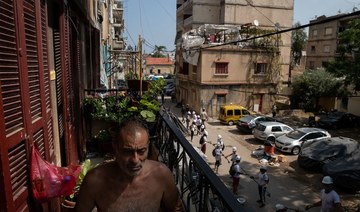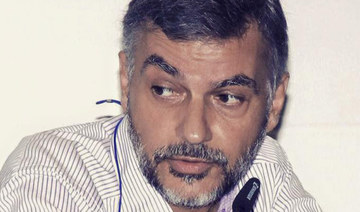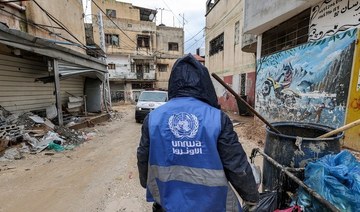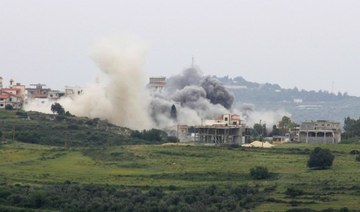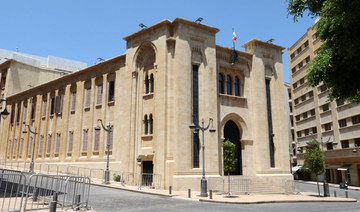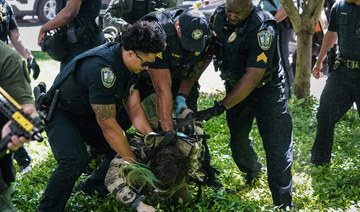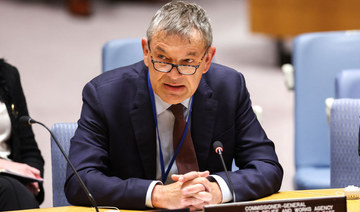BEIRUT: Arriving in Lebanon after last week’s deadly Beirut blast, US envoy David Hale bypassed politicians to head straight to a hard-hit neighborhood where young volunteers are helping people abandoned by their state.
At the volunteer hub dubbed the “Base Camp,” there is a “focus on getting things done,” Hale told a press conference after his tour.
He contrasted the hive of activity to the “dysfunctional governance and empty promises” of Lebanon’s political leaders, who face public outrage over the explosion of a vast stock of ammonium nitrate stored for years at Beirut’s port.
Volunteer efforts “could not only be tapped to rebuild Beirut but (also) to undertake necessary reforms that will bring the kind of transformation that is necessary for Lebanon,” Hale said.
In the wake of the August 4 explosion of a the huge chemical store that laid waste to whole Beirut neighborhoods, students and young professionals have ditched classes and day jobs to save lives, provide emergency support and start to rebuild.
Hale’s visit to the volunteer hub in the blast-hit Gemmayzeh district came days after French President Emmanuel Macron took a tour of the same street last Thursday, as well as meeting Lebanese leaders.
But while Macron was welcomed as a savior, it was clear that the heroes of the moment were the volunteers.
“I don’t know why (Hale) would do that second step and go to meet politicians,” said Wassim Bou Malham, 33, who leads a database management team at the Base Camp.
“The aid is happening here, the data collection is happening here, the cleaning is happening here, the reconstruction is happening here,” he told AFP.
Wearing face masks and neon vests, volunteers sounded like international experts as they explained how they were cleaning up their government’s mess.
In fluent English, they described 3D mapping operations, data collection and relief efforts organized since the cataclysmic blast.
Bou Malham, who spoke with Hale during the tour, is not a data expert but picked up useful experience managing client databases for two of Beirut’s biggest nightclubs.
After the blast tore through the city, wounding 6,500 people and displacing 300,000 from their homes, his skills became vital for the aid effort.
The digitised database developed by Bou Malham and his team of volunteers is now critical for sorting and delivering aid to thousands of blast survivors.
“We haven’t seen any government official or representative actually come in here and ask us if we need anything,” he said.
“It’s so funny that David Hale is the first.”
It is not only in the Base Camp that the state has been thin on the ground.
In the first hours after the explosion, civil defense teams were vastly outnumbered by young volunteers flooding the streets to help.
By the next day, the latter had set up a camp where they offered food, medicine, temporary shelter and repair services to thousands of blast victims, in partnership with several non-governmental groups.
Operations have continued to expand since.
A Base Camp relief hotline received more than 200 calls in the first two hours. Volunteers have assessed the damage to around 1,200 homes and installed at least 600 wooden doors.
“The work is going to speak for itself,” said Bushra, a 37-year-old volunteer.
Simmering anger against Lebanon’s leaders has flared since the blast, which appears to have been caused by years of state corruption and negligence.
With 171 people dead, it is widely seen as the most tragic manifestation yet of the rot at the core of the country’s political system.
Western donors too are fed up with Lebanon’s barons, who have for years resisted reforms demanded by the international community.
In a joint statement released after an international donor conference organized by France in the wake of the disaster, world leaders called for aid to be delivered directly to the Lebanese people.
USAID acting administrator, John Barsa, said at the time that American help “is absolutely not going to the government.”
USAID “will increase its financial support to civil society groups in Lebanon by 30 percent to $6.627 million,” Barsa said in a press briefing on Thursday.
At the volunteer camp in Gemmayzeh, it was clear that funding would be put to good use.
Ziad Al-Zein, arrives before volunteers start their shifts at 9:00 am to ensure the camp is clean and secure.
The 33-year-old was among the first groups of volunteers clearing debris in Gemmayzeh.
“We are not speacialists in crisis management or catastophe management. We are learning things as we go,” he said.
“There is no state,” he added. “We will not abandon our fellow Lebanese in these conditions.”
Streets before suits: US envoy vists Beirut’s ‘real’ rescue hub
https://arab.news/9mj8e
Streets before suits: US envoy vists Beirut’s ‘real’ rescue hub
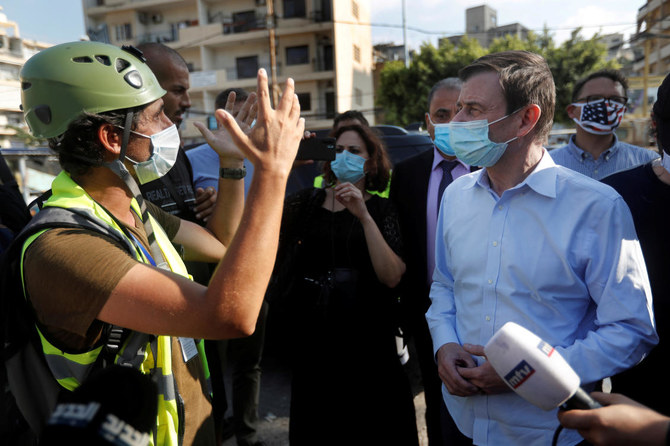
- Hale’s visit to the volunteer hub in the Gemmayzeh district came days after Macron took a tour of the same street last week
- Students and young professionals have ditched classes and day jobs to save lives and provide emergency support
Turkiye’s Erdogan postpones tentative White House visit, sources say
The source familiar with the matter, speaking on condition of anonymity, said it was unclear what prompted the postponement
WASHINGTON/ANKARA: Turkish President Tayyip Erdogan has postponed a White House meeting with President Joe Biden, a source familiar with the situation and a Turkish official said on Friday of a visit that had been tentatively planned for May 9.
A White House spokesperson, while not confirming the May 9 date, said: “We look forward to hosting President Erdogan at the White House at a mutually convenient time, but we have not been able to align our schedules and do not have any visit to announce at this time.”
A new date will soon be set due to a change in Erdogan’s schedule, the Turkish official said, requesting anonymity. The source familiar with the matter, speaking on condition of anonymity, said it was unclear what prompted the postponement.
The White House never formally announced the visit but a US official told Reuters in late March that following Turkish Foreign Minister Hakan Fidan’s visit to Washington, the White House offered and Ankara had accepted May 9 for a meeting between Biden and Erdogan.
That would have been the first bilateral visit to Washington since 2019 when Erdogan met with then President Donald Trump, a Republican. He and Biden have met a few times at international summits and spoken by phone since the Democratic US president took office in January 2021.
Ties between the US and Turkiye have been long strained by differences on a range of issues. While they have thawed since Ankara ratified Sweden’s NATO membership bid earlier this year, tensions persist over Syria and Russia and the war in Gaza.
Erdogan visited neighboring Iraq this week. Last weekend, he met with Hamas leader Ismail Haniyeh in Istanbul, the first meeting between Erdogan and a Hamas delegation headed by Haniyeh since Israel began its military offensive in the Gaza Strip following Hamas’ Oct. 7 attack.
Netherlands will consider resuming support to Palestinian UNRWA agency
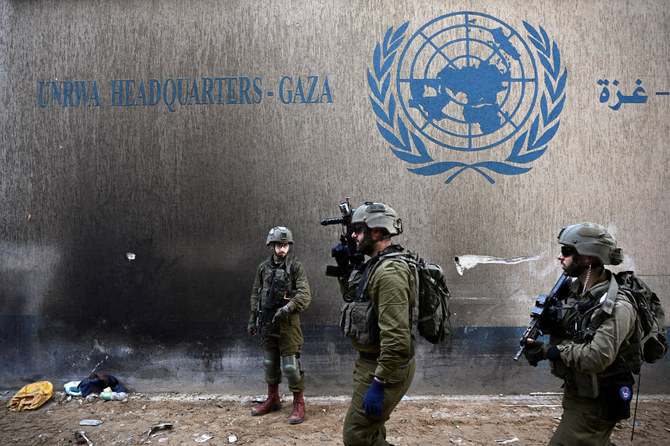
- The decision follows an investigation by the former French foreign minister Catherine Colonna
- The Colonna-led review of the agency’s neutrality concluded Israel had yet to back up its accusations
AMSTERDAM: The Dutch government on Friday said it would consider resuming funding for the UN agency for Palestinians (UNRWA) in Gaza if the agency implements recommendations to strengthen its neutrality.
The decision follows an investigation by the former French foreign minister Catherine Colonna released on Monday into whether some UNRWA employees were involved in the Oct. 7 attack by Hamas.
The Colonna-led review of the agency’s neutrality concluded Israel had yet to back up its accusations that hundreds of UNRWA staff were operatives in Gaza terrorist groups.
The Dutch government said it had already given its yearly donation to UNRWA in January, before the accusations against the agency came to light. It was one of several European countries that paused funding for the agency after the allegations were levied.
It said it did not foresee any additional donations in the near future, but would consider UNRWA as a potential partner if requests for aid were made.
150 shells hit Lebanese border towns in response to Israeli’s killing
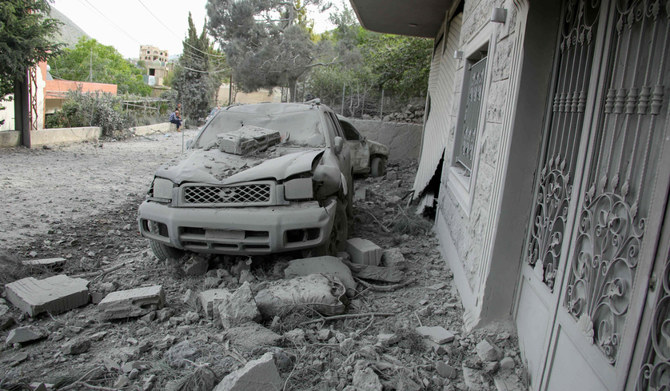
- 200 days of Israeli attacks against Lebanon have resulted in 1,359 casualties, including 344 deaths, ministry of health says
BEIRUT: The Israeli army responded on Friday to the combined operation carried out by Hezbollah in the occupied Shebaa Farms district — also known as Har Dov — with artillery shelling and airstrikes targeting the Tumat Niha area on the outskirts of Western Bekaa.
An Israeli was killed near the country’s northern border in a Hezbollah attack.
Israeli forces launched an airstrike on the outskirts of Shebaa and fired artillery shells on the outskirts of the town of Kfarchouba at dawn.
The outskirts of Shebaa, Kfarchouba and Helta were targeted with more than 150 Israeli shells.
Hezbollah members set up on Thursday night a “combined ambush of guided missiles, artillery, and rocket weapons targeting an Israeli motorized convoy near the Ruwaizat Al-Alam site, in the occupied Lebanese Kfarchouba hills.”
When the convoy arrived at the ambush point, according to Hezbollah’s statement, “it was targeted with guided weapons, artillery and rockets, destroying two vehicles.”
The party said that the Israeli army created a “smokescreen to retrieve losses.”
Hezbollah announced “targeting an Israeli force as it made it to the entrance of Al-Malikiyah site with artillery fire, and it was directly hit.”
The Israeli army confirmed the killing of a truck driver, Sharif Sawaed — a resident of Wadi Salameh — by an anti-tank shell fired by Hezbollah toward Shebaa Farms.
The Israeli army said that Sawaed was carrying out infrastructure work in the area targeted by the shell, where efforts are underway to set up a barrier on the border.
The Israeli army said that it “succeeded in retrieving the body of the dead soldier after a complex operation that lasted for hours under fire.”
The Israeli army said that warplanes later shelled Hezbollah positions in the villages of Kfarchouba and Ain Al-Tineh, a weapons depot, and a Hezbollah rocket launch pad in the Markaba area in southern Lebanon, and that two anti-tank shells were observed from Lebanese territory toward Shebaa Farms.
Israeli airstrikes led to the destruction of a house in Shebaa, two houses in Kfarchouba, and damage to more than 35 houses. One house was destroyed in Yarine, and another was destroyed in Dhayra.
Israeli artillery shelling targeted the area between the border towns of Yarine and Jebbayn.
Israeli newspaper Yedioth Ahronoth reported that the Israeli army launched an investigation into the Har Dov incident, as the engineering force was supposed to operate in the dark to avoid being targeted by Hezbollah’s missiles.
Israeli army spokesperson described what happened in the Shebaa Farms as “a difficult security incident on the Lebanese border.”
This was the first confrontation during which the Israeli army revealed details of casualties and the developments taking place at the target site.
The head of the Israeli Metula settlement council said: “It is insane how we lose houses and infrastructure every day,” adding that “Hezbollah is systematically and deliberately hurting the people of the north by doing so.”
He said that Hezbollah had “successfully deepened the security belt here after it made us flee the northern settlements.”
The Israeli army’s radio station has reported the death of 20 settlers on the Lebanese border since the start of the war more than 200 days ago.
An Israeli military drone struck a car on the Dhahira–Zalloutieh road in the border region.
The Israeli attacks against Lebanon, which have continued for 200 days, resulted in “1,359 casualties, including 344 dead people, most of whom are men,” according to a report published by the Lebanese Ministry of Health.
Israeli media outlets stated that “4,000 missiles were launched toward northern Israel from Lebanon since the beginning of the Gaza war, according to the Israeli army’s estimations.”
Hezbollah provided a detailed overview of the course of the military operations on the Lebanese southern border, stating that “it killed and wounded 2,000 Israeli soldiers, and carried out 1,650 diverse attacks, including downing five drones and targeting 67 command centers and two military factories.”
The group added that it carried out 55 aerial attacks and forced 230,000 settlers to evacuate 43 northern settlements.
Lawyer for arrested Palestinian academic warns move could set ‘precedent’ for free speech in Israel
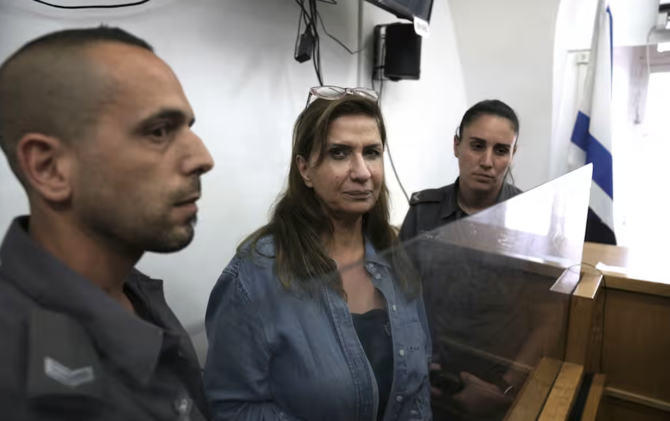
- Nadera Shalhoub-Kevorkian was detained for appearing on podcast to discuss state violence, genocide
- Hundreds of Palestinian citizens of Israel have been detained since Oct. 7 over criticism of Israel
LONDON: The lawyers for a Palestinian legal scholar arrested on April 17 have said her detention was “political” and could set a “precedent” for the treatment of academics and free speech in Israel.
Prof. Nadera Shalhoub-Kevorkian, a leading feminist academic with roles at the Hebrew University of Jerusalem and Queen Mary, University of London, was arrested after appearing on a podcast in March in which she discussed her work on state crimes, genocide, violence and surveillance in the context of the war in Gaza.
She was strip-searched by police, interrogated and denied access to food, water and medication for several hours, and held in a cold cell overnight before being bailed the next day. A number of her personal items, including posters and books, were also confiscated.
Hassan Jabareen, her lawyer and director of human rights organization Adalah, said: “This is not only about one professor, it could be a (precedent) for any academic who goes against the consensus in wartime.”
Israeli police claimed that she was being investigated on suspicion of incitement to terrorism, violence and racism, but a magistrate deemed she did not pose a threat after she was arrested, leading to her release.
Hundreds of Palestinian citizens of Israel have been arrested since the outbreak of hostilities after Oct. 7, with many detained for criticism of Israel.
All arrests in relation to freedom of speech issues must be signed off by Israel’s attorney general, and Shalhoub-Kevorkian has been ordered to return to face further questioning at the weekend.
Jabareen said: “They could have asked her to come to the police station for two or three hours to discuss, investigate.
“To carry out the arrest like that, as if she was a dangerous person, shows the main purpose was to humiliate her.
“It was illegal, that’s why the magistrates court accepted my argument that she should be released and the district court confirmed it.”
She added: “If they indict her, this might have a deeply chilling effect. It’s very difficult to prosecute a person for academic work … but the political situation in Israel is starting to not really be based on the rule of law.”
International academics have condemned Shalhoub-Kevorkian’s arrest and treatment, with over 100 colleagues from the Hebrew University of Jerusalem publishing a letter in support of her.
In addition, 250 academics at Queen Mary have signed a separate letter saying: “Academic freedom (in Israel) has come under sustained attack.”
In the Hebrew University academics’ letter, published by Israeli newspaper Haaretz, her colleagues said: “Regardless of the content of Nadera’s words, their interpretation and the opinions she expressed, it is clear to everyone that this is a political arrest, the whole purpose of which is to gag mouths and limit freedom of expression. Today it is Nadera who stands on the bench, and tomorrow it is each and every one of us.”
The Hebrew University also issued a short statement of support, despite the fact that in 2023 she was briefly suspended and asked to resign by the university’s rector after she called for a ceasefire in Gaza and suggested Israel could be guilty of genocide.
“We strongly object to many of the things that Prof. Shalhoub-Kevorkian said. Nonetheless, as a democratic country, there is no place to arrest a person for such remarks, however infuriating they may be,” it said.
Gaza baby rescued from dead mother’s womb dies

- Doctors were able to save the baby, delivering her by Caesarean section
- The baby suffered respiratory problems and a weak immune system, said Doctor Mohammad Salama who had been caring for Sabreen Al-Rouh
RAFAH, Gaza Strip: A baby girl who was delivered from her dying mother’s womb in a Gaza hospital following an Israeli airstrike has herself died after just a few days of life, the doctor who was caring for her said on Friday.
The baby had been named Sabreen Al-Rouh. The second name means “soul” in Arabic.
Her mother, Sabreen Al-Sakani (al-Sheikh), was seriously injured when the Israeli strike hit the family home in Rafah, the southernmost city in the besieged Gaza Strip, on Saturday night.
Her husband Shukri and their three-year-old daughter Malak were killed.
Sabreen Al-Rouh, who was 30-weeks pregnant, was rushed to the Emirati hospital in Rafah. She died of her wounds, but doctors were able to save the baby, delivering her by Caesarean section.
However, the baby suffered respiratory problems and a weak immune system, said Doctor Mohammad Salama, head of the emergency neo-natal unit at Emirati Hospital, who had been caring for Sabreen Al-Rouh.
She died on Thursday and her tiny body was buried in a sandy graveyard in Rafah.
“I and other doctors tried to save her, but she died. For me personally, it was a very difficult and painful day,” he told Reuters by phone.
“She was born while her respiratory system wasn’t mature, and her immune system was very weak and that is what led to her death. She joined her family as a martyr,” Salama said.
More than 34,000 Palestinians, many of them women and children, have been killed in the six-month-old war in Gaza between Israel and Hamas militants, according to the Gaza health ministry. Israel denies deliberately targeting civilians in its campaign to eradicate Hamas.
Much of Gaza has been laid to waste by Israeli bombardments and most of the enclave’s hospitals have been badly damaged, while those still operating are short of electricity, medicine sterilization equipment and other supplies.
“(Sabreen Al-Rouh’s) grandmother urged me and the doctors to take care of her because she would be someone that would keep the memory of her mother, father and sister alive, but it was God’s will that she died,” Salama said.
Her uncle, Rami Al-Sheikh Jouda, sat by her grave on Friday lamenting the loss of the infant and the others in the family.
He said he had visited the hospital every day to check on Sabreen Al-Rouh’s health. Doctors told him she had a respiratory problem but he did not think it was bad until he got a call from the hospital telling him the baby had died.
“Rouh is gone, my brother, his wife and daughter are gone, his brother-in-law and the house that used to bring us together are gone,” he told Reuters.
“We are left with no memories of my brother, his daughter, or his wife. Everything was gone, even their pictures, their mobile phones, we couldn’t find them,” the uncle said.





